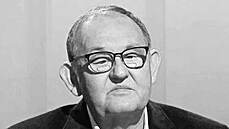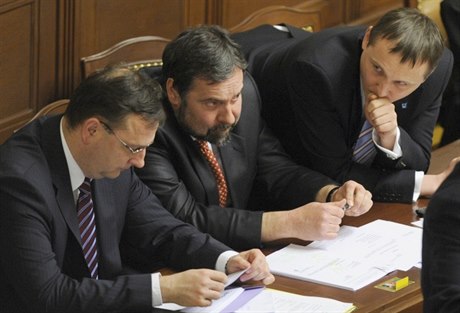President Václav Klaus says he hopes that appointing new ministers has warded off the coalition crisis, which, in his opinion, has harmed everyone. After 10 days of biding his time, which only served to prolong the crisis, on April 21 he accepted the resignation of the de facto leader of the Public Affairs (VV) party, Vít Bárta, from his post as transport minister.
Klaus also accepted the request for withdrawal of VV chairman Radek John from his post as interior minister. John submitted his resignation 10 days previously to Prime Minister Petr Nečas (Civic Democrats, ODS). For the time being, Education Minister Josef Dobeš (VV) remains in his post, even though Nečas wanted him to be dismissed as well.
However, during the April 18 session of the center-right ODS–VV–TOP 09 ruling coalition, TOP 09 leader Karel Schwarzenberg put in a good word for Dobeš with the prime minister. A truly elegant diplomatic stunt that was! Thus, before the public, Nečas had to climb down from his requirement that all those connected with Bárta’s old security agency ABL — Dobeš included — must leave the coaltion government.
In doing so, Nečas could claim that he was only satisfying Prince Schwarzenberg’s wish! Afterwards, VV kept at least one ministry of the three they had previously and gained the post of coordinator of the fight against corruption for John, who will remain as a deputy prime minister.
The party has avoided a debacle that would mean that the offended VV had to leave the coalition, as they had threatened at the government meeting. And they have immediately stopped insisting upon the departure of Finance Minister Miroslav Kalousek (TOP 09) and Agriculture Minister Ivan Fuksa (ODS) from the government.
Personnel problems
The appointment of the new ministers has, however, only formally ended the government crisis. Why? Let us begin with personnel matters. Deputy Minister Michal Moroz, originally an employee of a security agency closely collaborating with Bárta’s ABL, has also left the Interior Ministry. John has already indicated that he could take Moroz to his new deputy prime minister’s office.
Newly named Transport Minister Radek Šmerda (unaffiliated), who was until recently Bárta’s deputy, has said he still intends to continue to consult his actions with his old boss. By the way, Bárta has resolved that once he has done his penance we will return to the government. Although Nečas cannot a priori prevent him from doing so, he certainly does not want it to happen. Nečas’ problem is that Bárta will continue to have “long fingers” and be heard and seen, if only as a VV rank-and-file parliamentary deputy. Accordingly, the “de-ABL-ization” of the public administration will be a long process, as Nečas rightly assumes.
Moreover, Nečas could easily find himself in a tight corner if in May the VV party members elect Bárta their official chairman in place of John. They can take examples from the past: As chairman of Christian Democrats (KDU-ČSL), Miroslav Kalousek was not a member of the government, yet he still managed to redirect his party against the Social Democrats (ČSSD), its coalition partner, and “put through” the overthrow of Prime Minister Stanislav Gross.
Support with strings attached
Bárta is not the only one to be taken heed of. Shortly after the coalition agreement was reached, the VV’s parliamentary club resolved that the party’s support for the Nečas Cabinet would be conditional. They have given him until the end of June to come to an agreement on pension and health reforms, to restructure the government and create an office for the fight against corruption for Deputy Prime Minister Radek John — the new “anti-corruption czar.” Only then will VV decide whether they will vote for the respective bills that the government intends to connect to its request for a vote of confidence in the Parliament (set for April 26). The ‘blackmail potential’ of the non-coalition VV could grow significantly.
The second variation would mean VV going into opposition, from where they could — but need not — support the reform bills, which would then be brought forward by a minority government made up of the ODS and TOP 09. The “blackmail potential” of the non-coalition VV would grow significantly.
This is, after all, the reason why, following last year’s election, Nečas wanted (and still wants to) have VV in the government although he has paid for it by allowing VV-ABL to infiltrate the state apparatus. When it comes to the most risky ministry — that of the Interior — its new boss, the former top policeman Jan Kubice, says that he is a man of firm principles and opinions and despises politicians.
Nevertheless, judging by the Kubice report — which four days prior to the 2006 election he handed over to the defense and security parliamentary committee and which (not only in the opinion of the Social Democrats) affected the election result — he is in all probability not a politically neutral person. Therefore, it will be difficult for Kubice to stabilize the Interior Ministry, especially in the event that, 20 years after the democratic changeover, the “struggle for the interior” is to continue.
Unresolved issues
Let’s return, however, to the government crisis itself. It is far from being over, since it has not brought clear answers to the essential questions. The first relates to the stability of the parties in the governing coalition. TOP 09 entered the coalition crisis as a unified party and, for the time being, has got through it without problems. TOP 09 entered the coalition crisis as a unified party and for now remains so; the opposite is true as regards VV and the ODS.
Yet the opposite is true as regards VV and the ODS. VV has always been and still is a heterogeneous, unreliable structure, whose political behaviour is impossible to predict. Only such a “party” could put at the head of its parliamentary club a young woman who has worked on its division. Has this division ended with Kristýna Kočí being kicked out of VV, or will it continue and Public Affairs will still threaten the government’s stability?
Moreover, should it be confirmed that Kočí carried out these destabilizing activities with the knowledge of (or help from) the leader of the ODS parliamentary club, Petr Tluchoř, and that, as Klaus said, in Nečas’ party there is a “Tluchoř clique” aiming at upsetting the conciliation agreed at the coalition meeting, then the lengthy crisis within the ODS will get worse.
How (and for how long) would the party bear up against this crisis, given that Klaus himself is undermining the not-exactly-firm Nečas? Klaus is playing his own game, with the aim to make sure that he will have his say after he has left the Castle, a game that serves to weaken Nečas’s government.
Accordingly, a few personnel changes have not rectified the deep-rooted reasons for the governing coalition’s instability. Therefore, anything can become a pretext for a future war within the coalition Cabinet: Alexandr Vondra, Josef Dobeš and the other candidates for departure from the government; health and pension reforms; and other contentious topics that will naturally come along.




